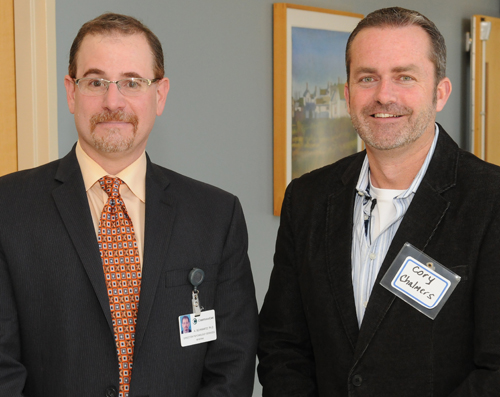Symposium explores causes, treatment of hoarding disorder


Reality television brought hoarding into the public lexicon, but as participants learned during a day-long symposium co-sponsored by Christiana Care Health System, treating this complex disorder is far more difficult than simply cleaning out the hoarder’s home.
“With a cleanup, we’re taking the bottle away from an alcoholic and telling them, ‘I’ve cured you; you’re fixed,’ and we know that’s not true. That’s why so many abatements happen and then the hoarder moves back in and starts again,” keynote speaker Cory Chalmers said at “Addressing the Mess: A Delaware Hoarding Symposium,” held Nov. 4 at the John H. Ammon Medical Education Center at Christiana Hospital. The audience of 270 included health care professionals, social workers, first responders, code enforcement officers and members of the public.
Chalmers, CEO of Steri-Clean Inc., has 18 years of experience in hoarding remediation and was featured on the Emmy-nominated A&E Network series, “Hoarders.” Of the TV series, Chalmers said that “reality does not mean true to life,” and that while it helped by bringing awareness to the problem, for dramatic purposes the show used people who were not really ready for their homes to be cleaned and instead needed much more mental-health counseling first.
Alan Schwartz, PsyD, director of psychology for Christiana Care at the Center for Comprehensive Behavioral Health, tackled the challenges of treating hoarding disorder in his presentation, “Holding On and Letting Go: Understanding and Treating Hoarding Disorder.” Hoarding only recently has been recognized as a mental disorder, and researchers still have much to learn about it.
“Hoarding of possessions is a serious but largely hidden clinical problem,” Dr. Schwartz said, sharing a tale of a patient he met with several times before realizing she suffered from hoarding disorder. “Most people with hoarding disorder don’t seek treatment, are reluctant to raise hoarding issues even if they are in treatment and, due to the nature of their illness, exhibit exquisite avoidance as a defense.”
People with hoarding disorder typically have difficulty discarding things, regardless of value, and accumulate clutter to the point that it causes distress and loss of functionality of parts or all of their home. The illness typically appears in early adolescence and worsens with each decade, particularly after a trauma or with the loss of a loved one, either through death or simply a child or former spouse moving out of the home. Seventy-five percent of people with hoarding disorder also have another psychiatric disorder, such as depression, anxiety or ADHD.
“Discarding possessions, or thinking about discarding possessions, is very punishing for people with this disorder, so they just avoid it. Thinking about throwing away a piece of junk mail feels the same as thinking about throwing away a precious family heirloom.”
Effectively treating the disorder requires first helping the person understand why they hoard, and helping them identify the beliefs and behaviors that contributed to them accumulating clutter. They then must be taught decision-making, problem-solving and organizational skills to help them both successfully reduce their current clutter and prevent them from returning to hoarding behaviors.
“We can clean out a house 10 times, but if we don’t change how the person thinks about things, their attachment, you’ll be back at their door again with more trucks,” Dr. Schwartz said.
Secretary Rita Landgraf of the Delaware Department of Health and Social Services, which co-sponsored the conference, gave the opening remarks and thanked Christiana Care for hosting the conference.